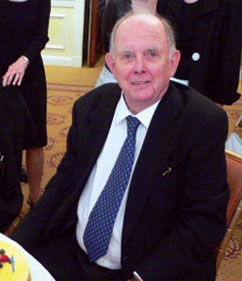 Historian of Modern Italy
Historian of Modern Italy
With the death of Benjamin F. Brown IV on November 28, 2011, the field of modern Italian history lost one of its premier researchers. He came to the study of Italian history by a circuitous path. Born in Temple, Texas, on June 24, 1930, he grew up in Waco, majored in English at Baylor University, and earned a Master's degree in Latin American Studies at the University of Colorado. While working for Bank of America in San Francisco, he enrolled in graduate courses at the University of California, Berkeley. He then transferred to Harvard University, where he studied with the eminent intellectual historian and Italianist, H. Stuart Hughes. For a PhD dissertation topic, he chose to write on Sidney Sonnino, Italy's foreign minister during World War I and at the Paris peace conference. A Fulbright grant enabled Brown to conduct his research in Italy.
Despite Sonnino's historical importance, little scholarly work had been done on him. His papers were assumed to have been lost or destroyed. Ben sought to reconstruct the life of this pivotal figure, on the basis of what he expected to be a fragmentary historical record. Following the completion of the dissertation, he began his teaching career, first at Sonoma State University in California and then at the University of Kansas. He continued to compile research for what he hoped would be a book on Sonnino.
While visiting the Sonnino family home in Montespertoli, Ben discovered 14 trunks in a back room. Upon opening them, he found the raw documentary material for a missing chapter in Italian history. The trunks contained Sonnino's long-lost official diplomatic correspondence, diaries, letters, and a profusion of his unpublished writings and speeches. This extraordinary find became the subject of front-page newspaper stories in Italy. The subsequent publication under Ben's direction of selected Sonnino documents and correspondence in eight volumes from 1972 to 1981 by the Laterza publishing house and the University of Kansas Press established his reputation as a leading authority on the history of modern Italy. Commenting on the significance of the Sonnino papers, the University of Florence historian Giorgio Spini declared that they would add immeasurably to an understanding of virtually every phase in the post-Risorgimento history of Italy down to the triumph of Fascism. The American Historical Association honored Ben in 1974 with the Howard Marraro Prize in Italian history. The Guggenheim Foundation awarded him a research fellowship in 1977.
Though an award-winning researcher and an effective teacher of the caustically ironical type, he decided to leave the academic world. The battles that had to be fought over the Sonnino papers project left him feeling the need for a career change. Following the Guggenheim fellowship year, he joined the Directorate of Intelligence at the Central Intelligence Agency, first as a scholar-in-residence and then as senior political analyst. He focused his attention initially on Southern Europe and later on Latin America. His gift for languages and fascination with travel found a ready outlet in the work that he did for the CIA. He retired from this second career when his wife, Clara Lovett—also an accomplished historian of Italy—accepted the position of president at Northern Arizona University in Flagstaff. After her retirement from the presidency, they moved to Phoenix. Ben became a trustee of the Phoenix Symphony Orchestra and actively involved himself in many other civic and cultural affairs. He and Clara recently had begun to live part of the year in the East. He died peacefully at their home in Chevy Chase, Maryland.
Through all of the many phases in his career Ben remained deeply interested in education. He gave generously of his knowledge to other scholars, participated actively in fund-raising, and helped to support students with scholarships at the University of Colorado, Boulder, and at the Graduate School of Management in Glendale, Arizona. The Sidney Sonnino archive at Montespertoli stands as a monument to Ben's indefatigable energy and resourcefulness as a scholar. The books of documents that he saw through to publication are a contribution of permanent value to historical knowledge. He leaves his wife, family members in Texas, and many friends. Those left behind grieve for the loss of this large-hearted, learned, and adventurous man.
—Richard Drake
University of Montana
Tags: In Memoriam
Comment
Please read our commenting and letters policy before submitting.






